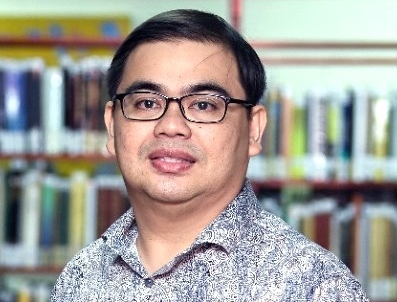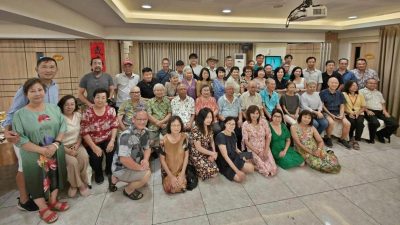 By Associate Professor Dr Awang Azman Awang Pawi
By Associate Professor Dr Awang Azman Awang Pawi
Dear Chinese fellows,
Allow me to share my past and present life with you. As the nation is celebrating the Lunar New Year, I am instantly reminded of the atmosphere during my school days some 25 years back.
I was studying at a multiethnic school in the city of Kuching with Chinese, Malay, Iban, Bidayuh, Orang Ulu and a handful of Indian students. We almost never heard of things like UEC, Jawi or negative comments about Muslims saying Merry Christmas or Gong Xi Fa Cai.
Even though these multiethnic students learned Jawi at the primary school, they were never converted to Islam. There was this smart Chinese boy taking Islamic studies and scored A1 for the subject and later furthered his studies abroad.
We ate together during recess at the school canteen and did our routines according to the duty roster. There was absolutely no issue with racial rivalry, bullying or halal-haram question because we all knew how to respect one another. We never considered our differences in skin color, ethnicity and religion as divisive walls.
There were Iban and Chinese kids playing at Malay houses and vice versa. No prejudices or bad stereotypes. Only harmony and joy.
During PE lessons we played the sports we liked. Back then the Chinese loved table tennis while we bumis preferred hockey and football.
Our history teacher Mr Chua from Perlis taught us like a university lecturer, telling us stories like a historian without reading out the textbook.
And our General Studies (Pengajian Am) teacher Cikgu Hamsiah Wong Abdullah always made sure we had a good command of general knowledge and current affairs by reading Berita Harian. The articles and commentaries were put on the notice board at the back of the classroom on a weekly basis for the students to read.
Our BM teacher Cikgu Sopiah was such an excellent teacher that we still remember her kindness until this day.
In the class we competed with one another in a healthy way, and we were very happy competing with the world healthily without even having any idea about industrial revolution 4.0.
Not everyone could afford to buy a copy of newspaper on a daily basis. Although most students at SMK Green Road were relatively well-off, there were few who could not afford school fees or lunch during recess.
Those poorer students were mostly from the indigenous communities, and many families with a lot of children drew salaries below RM1,500 a month in early 1990s. Imagine life without BR1M and book vouchers for these people.
Many only had plain water during recess as they hoped to rush back after school to eat at home. Some of them lived in squatter houses but in no way should poverty batter their spirit to excel in school. Intercommunity puppy love was not a taboo back then although not all would end up marrying their first loves.
There were no WhatsApp, Facebook, YouTube, Netflix, Astro or Instagram during those years. The word "smartphone" was not even found in our dictionaries.
We needed to buy many textbooks for the Form Six literature class. We had short story, novel, Hikayat Hang Tuah and Malay history discussion groups. Those from families earning under RM1,500 a month would have problem getting the textbooks.
Many of us just photocopied the entire books to save money, but even then not everyone could afford the photostat charges. There was this classmate of mine who could not afford to photostat, less so to buy the textbook even though he was the only child in his family who managed to go as far as Form Six. He was almost desperate because of the financial problem but did not want to burden his parents. Fortunately his dilemma was quietly observed by a female Chinese classmate.
Hycthia Chung took the initiative to photocopy the entire 500-page Hikayat Hang Tuah for the Malay boy while she bought herself a new book.
We also discussed among ourselves about our own religions and cultures in a bid to get to know one another better.
I happened to meet Hycthia after more than 20 year, and she told me she was not from a rich family but her father could at least support her studies at that time.
Her father owned a lorry repair workshop but many lorry and truck companies failed to pay him for the repair services. At first Hycthia was wondering why there were so many vegetables and fruits sent to her house, but she later realized that they were sent in by suppliers who could not afford to pay her father their truck repair costs.
Hycthia is now an English teacher with a bachelor's degree from the United States.
Things have changed! During Pakatan Harapan's time now, sensitive racial issues are raised regularly; intercommunity relationship is becoming increasingly lax and interactions rare.
More than 90% of Chinese voters who voted for the PH during the last general elections hoped the new government would listen to their woes but many have since been disappointed as in the UEC and Jawi calligraphy issues.
Meanwhile, the Malays also perceive PH as being insensitive to their issues such as religion, language, the royal institution and the Malay culture. They also defend their constitutional right over the issue of matriculation admission.
Such opposing narratives have been exploited by irresponsible politicians to further undermine the country's political stability.
As a matter of fact, majority of people in the lower segment of the society do not actually have any problem with regard to racial problems. All that they want is a decent job that feeds their families.
Many Malays work for their Chinese bosses in shops or large companies even though there are rumors of discrimination in remunerations and Mandarin requirement. Meanwhile, the Chinese business owners need their Malay workers to support their businesses.
There is also no problem among the Chinese and Malay elites as evidenced by the many joint ventures they share.
It is obvious that the Chinese and Malays need one another. The racial problems that we now see could be attributed to politicians who have raised these issues for their own benefits and survival.
Let's get rid of racial politics, stereotypes and prejudices. As citizens of Malaysia, we are obliged to safeguard the concept of moderation and put the country's interest above our own.
Rukun Negara must be firmly planted in our hearts and not just on the back of our children's exercise books.
Together let's uphold the supremacy of our Constitution because this is our Land.
It is hoped that in the Year of the Rat we will all be smarter, more sympathetic, pragmatic, diligent and honest as citizens of Malaysia, the country where we were born and raised and which we all share together.
A Happy and Prosperous Chinese New Year to all. Gong Xi Fa Cai.
(Associate Professor Dr Awang Azman Awang Pawi is Senior Lecturer at Department of Socioculture, Academy of Malay Studies, Universiti Malaya.)
ADVERTISEMENT
ADVERTISEMENT


































